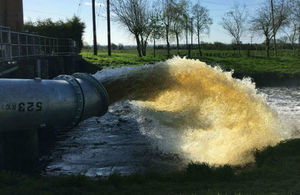Exercise Ash will test water pumps on Somerset Levels
Extra pumps will be set up at Westover and Huish Episcopi pumping stations in a drill to test emergency readiness of engineers.

High volume water pumps can move more than a tonne of water every second
Environment Agency engineers from across England will descend on two Somerset pumping stations next week (14 to 17 August) for Exercise Ash.
Huish Episcopi Pumping Station and Westover Pumping Station, near Langport, will see pump specialists and incident operatives sharpen their major incident skills in preparation for any serious flood.
High volume pumps - which can fill two average sized bathtubs every second - will be deployed at the stations, increasing water pumping capacity.
Westover Pumping Station removes water through three permanent, electric, submersible pumps at a combined rate of 1,800 litres per second. Huish Episcopi Pumping Station also has three permanent pumps and removes water at combined rate of 5,610 litres per second.
John Rowlands of the Environment Agency said:
Somerset has experienced a number of flooding incidents in recent years, most notably in 2013/14 when communities were impacted by flood water. That winter was the wettest for 250 years in parts of the country with only one completely dry day in nearly two months in Somerset.
This unprecedented event led the Environment Agency to consider what else we could do to reduce the impact of a similar flood in the future.
In the summer of 2014, we developed a series of trigger points. When certain criteria is met - more than 100mm of rainfall forecast in 5 days, water levels on the moors rise more than 50mm per hour and a geographical feature (normally a road) is inundated - additional pumping capacity will be deployed at certain locations.
These trigger points were rolled out at a series of community meetings over the autumn and winter of 2014 and Exercise Ash will test this commitment next week.
Severe flooding can also have a detrimental impact on the ecology and agriculture and depending on the time of the flood can take years for the landscape to recover.
As part of the Somerset Levels and Moors 20 Year Flood Action Plan, regular testing of our resilience via training exercises on an annual basis will provide reassurance for communities at flood risk.
The pumps will be loaded onto a lorry at an Environment Agency depot in Bawdrip village a few miles north of the pumping stations on Monday, 14 August. They will reach the pumping stations the same day. It will then take a whole day to unload and deploy them before they are switched on. Different exercise teams will practice attaching the pipes over the course of a week.
John Rowlands said:
Deploying and attaching these pumps takes a significant amount of planning and because these pumps can be used anywhere in the country. We’ve invited engineers from across the Environment Agency to come and put their incident skills into practice.
This, alongside the work of our partners, will make a huge difference in reducing the frequency, duration and severity of flooding in the future.
Partner organisations have been invited to attend Exercise Ash as observers, including Avon and Somerset Local Resilience Forum, Somerset County Council, Internal Drainage Board and the Devon and Somerset Fire and Rescue Service.
It is important that everybody is aware of their own flood risk. People can find out how to get ready and check their flood risk at https://www.gov.uk/prepare-for-flooding or by calling Floodline on 0345 988 1188.
Notes for Editors:
There are 21 permanent pumping sites in Somerset. Pumping stations are set to operate automatically according to water levels in the rhynes draining the moor or flood alleviation schemes. These pumps cannot operate if the receiving river is full, when spillways are operating or river banks are overflowing. This is why trigger points are in place, which alert the Environment Agency to start deploying mobile pumps. Triggers include specific roads starting to flood, the forecast of heavy rain, and moor water levels rising above 50mm/hour.
Huish Episcopi Pumping Station and Westover Pumping Station were built in the 1960 as part of a suite of works around Langport. Another two pumping stations were built at the same time – Long Load Pumping Station and Midelney Pumping Station. They are all located next to rivers – Huish Episcopi and Long Load on the River Yeo, Midelney on the River Isle and Westover on the River Parrett. They pump water from the adjacent moors (38 million cubic metres of water when the moors are full) which form part of the entire 160,000 acre Somerset Levels and Moors.
The 20 Year Flood Action Plan was jointly created by a broad range of local and national organisations and communities, and is overseen by the Somerset Rivers Authority.